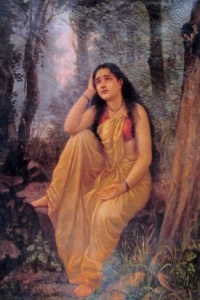
Ilaa
Close to the city of Paithan, in a small village called Sauviragram, which lay along the banks of the great river Godavari, lived a woman named Ilaa. Being cotton farmers, her family was well to do, but not among the richest in their area. It was the harvest season, and cotton had to be picked from the plants. The wholesalers and traders from Paithan would be arriving in just a few weeks, carrying gold and goods for barter. They would exchange what they carried for the cotton that the farmers grew. The bales of cotton had to be ready in time. Work was at its peak.
But Ilaa was not to be found in the fields. She wasn't working. Instead, she was sitting by the banks of the great river Godavari.
'I am sick of this!' she grunted loudly, as she looked down on her hands, scarred and bleeding from picking the rough bolls of cotton for days now.
“If Baba were here, I wouldn’t be subjected to this indignity!”
Tears flooded Ilaa’s eyes as she thought of her dear Baba, her strong and versatile father, who with a twinkle in his eyes overrode all opposition to his only daughter being educated alongside his son. Ujjwal, Ilaa’s mild-mannered brother from a young and tender age had shown a leaning towards letters which delighted his illiterate yet enlightened father. He had the most renowned Brahmin, Dyaneshwarji in the village accept Ujjwal as his shishy.
Ilaa, a girl child born after five generations in his family was Baba’s delight; he named her Ilaa after the goddess of speech and also the female form of the first ruler of Paithan. Ilaa followed her brother everywhere and could not be separated from him even at the Gurukul. She learnt what Ujjwal did twice as fast; her interest in her brother’s studies pleased her father even more. Baba convinced Dyaneshwarji to let her attend classes in Vedic studies too. He entertained notions of his daughter growing up to being a great sage like Lopamudra, Gargi and Maitreye of the Vedic ages.
Ilaa was an imp as a child, everyone doted on her, everyone that is, except for her Ajoba, her grandmother, Baba’s mother. Ajoba hated Ilaa from the day she saw her son’s eyes shine with unconcealed adoration for his beautiful little baby daughter. Ajoba disliked anyone taking away her son’s affections; she barely tolerated Ilaa’s, gentle Ai. Only because of Ai’s utmost patience with the older lady’s love for her only child, did that fragile relationship work.
Baba was born late in Ajoba and Bhau’s marriage, long after Bhau’s mother had married him off to another doe eyed beauty who had given him three boys and Ajoba was maligned with the word ‘infertile’ by the people of the village. In a society that places value on a woman’s ability to provide an heir to continue her husband’s bloodline, side-lined by her own family and ostracised by the villagers, hers was a lonely and miserable existence.
Bitter from the taunts of the villagers and pettiness of Bhau’s other family, she had all but given up hope for any happiness in her life, when by the grace of the Gods she found herself the mother of a strapping young baby boy. This happy turn of events should have restored her good nature, however, she refused to let go of the past and remained embittered, mistrustful and ill-tempered, alienating herself from the whole village. If there was any good left in her it was reserved for her only child, whom she brought up with jealous affection.
Bhau’s other three sons died at various stages of growing up as the times were harsh and the weak in spirit were wont to. All the families’ lands and rich cotton fields were passed down to Baba, “as is rightful,” Ajoba had said unfeelingly to her rival. It was credit to the young boy that he did not grow up to become anything like his draconian mother. He was wise, free spirited, quick to laugh, finding the good in everyone and everything. As he grew into manhood his charming temperament won over the entire village and with it the Headman’s educated daughter, the old lady given no choice reluctantly accepted. This was the first of many battles that Baba would fight with his mother and win. Sending Ilaa to school would be another.
As llaa reminisced about the past she again thought of her predicament.
Baba was gone!
He had followed the Peshwa Baji Rao’s call to arms to every able bodied man against the cursed ruler of Hyderabad, Nizam-ul-Mulk. How the whole family had begged Baba not to go, he was a farmer they said, Ajoba had wept and threatened, Ujjwal had pleaded, Ilaa had cried, to no avail! Baba's mind was made up! Ai, said nothing, with pride in her eyes she had performed the aarti and bade Vijayi Bhava, (return victorious) to the love of her life. That was Ai, stoic with complete faith in Baba and her Gods.
Baba left the responsibility of the farm and household to Ajoba, knowing his wife to be too timid to stand up to his mother and Ujjwal was more an academic than a farmer. Many of the farm hands and men of the village had followed Baba, a natural leader of men. Soon after the harvesting season for the cotton had arrived, and Ajoba's first directive had been to pull Ilaa out of school to help out in the fields. Ujjwal was allowed to continue.
"Girls should be helping out at home and in the fields, going to school, ridiculous!" she announced. "Your father had foolish notions for you girl, sixteen already and no prospects of getting married yet, your place from now is at home!"
Ilaa, the darling of her father, not used to being denied her every wish, stood up against her grandmother. It was a sight to see, the grandmother with her head shaven and dressed in all white, ramrod straight, with the stiff bearings of a woman used to getting her own way, the grand-daughter young, beautiful and vibrant her eyes flashing.
"The Rig Vedic society was a free society; women were as free as the men. Education was equally accessible for boys and girls. Girls studied the Vedas and fine arts," Illa reasoned.
"Nonsense! These are not the Vedic times, no man will marry a woman who knows the Vedas but doesn't know any housework," retorted Ajoba. “You are responsible for the management of your future household and need to learn to be a devoted wife, taking care of her husband’s needs.”
"But, brahmavadinis or married female scholars like Lopamudra, Sulabha Maitreyi, Gargi are still revered and they strengthened the knowledge of their husbands," countered Ilaa.
"Silly child," laughed Ajoba, "Too much in the company of books has turned your mind to mush!"
"But the Mahanirvana Tantra praises the birth of a scholarly daughter in these words: 'A girl also should be brought up and educated with great effort and care," tried Ilaa. "Enough!" thundered the formidable old lady, "there is no more to be said, you will do as I say."
With neither the matriarch nor the young woman giving way, the atmosphere in the house was fraught with stress. Finally, Ai pleaded with her daughter to stand down.
"It's only a matter of some time," she appealed, "Your father will be back soon, life will go back to the way it was."
Where the commands of the grandmother did not deter Ilaa's resolve, her gentle Ai's entreaty could not be ignored, with a sigh she gave in. Peace returned to the household and Ilaa hid her unhappiness well.
Till today!
The previous night Ujjwal had returned from the Gurukul excited, he’d pulled Ilaa aside and given her the news.
“Ilaa, you won’t believe what’s happened! Dyaneshwarji has been invited to the brahmayajna, the annual discourse at Sant Jaganade Maharaj Temple in Paithan, next week. He’s been asked to bring two of his most promising students to participate too. There’s to be a pariksha day after to decide who would be going. Guruji has asked you to participate as well!”
For a moment Ilaa forgot that she was not allowed to attend school anymore, “We are the brightest in the class, Guruji has always said, we are sure to be selected! Why the pariksha?” she asked.
“He probably wants it to appear fair,” replied Ujjwal, “the other students and their parents would complain otherwise. He’s asked you to attend school from tomorrow. We need to prepare.”
Ilaa’s eyes shone with excitement, she’d been dreaming of this day for years, ever since she had heard the story of Gargi, the Vedic prophetess and daughter of sage Vachaknu, who with her knowledge had stumped many eminent sages in her time.
Suddenly, Ilaa’s face fell as she remembered, “Ajoba will never let me go,” she whispered.
This morning when she reached the fields and looked around her, she could not take it anymore, she'd run till she had collapsed at this, her favourite spot near the holy river Godavari, hidden from prying eyes by an ancient banyan tree. The sun danced on the dappled waters of the river while tiny fish darted in the darkened pools formed on its rocky banks, Ilaa sat there in reflective melancholy oblivious to the beauty of her surroundings. Normally this place would bring calm to her restive mind, not today; the peace that she craved eluded her. Her heart was breaking into tiny pieces.
"I can't go on like this anymore! It’s not fair!"
“I knew I’d find you here. Did you know this used to be my favourite place too, to hide away from the world?” she heard her mother say as she sat down next to her.
“Ai!” with tears flowing down her eyes Ilaa rested her head in her mother’s lap.
Ai ran her fingers through Ilaa’s thick black hair, “My lovely child!”
“Did Ujjwal tell you about the brahmayajna?”
“Yes.”
“It’s not fair, Ai!”
“I know, you’ve been very patient, my child,”
“This was my dream, Ai!”
“Yes, I know that’s why I’m here. To release you from my request for peace in the house, I want you to follow your dreams.”
“You can’t be serious Ai, you know Ajoba will never let me!”
“Your Ajoba has had a difficult life, child,” began Ai.
“That does not give her the right to destroy my life,” interrupted Ilaa, vehemently.
“No one is destroying your life Ilaa,” laughed Ai, “let me finish.”
“Your Ajoba as a young woman was a lot like you, she too wanted to be educated but never got the opportunity. Married off young she gave her heart and soul to her new family, you are very well aware of how things turned out for her. I know deep down in that prickly exterior beats a kind heart.”
“Your joking right Ai, Ajoba’s kind heart, ha! Are we discussing the same woman?”
“To be fair to her Ilaa, she may have a harsh tongue, but she’s never been mean to me. I’ve always had my space and taken my own decisions.”
“Ai, that’s because of your own generous and kind nature.”
“No dear, she’s always been possessive of your father, but ever since I’ve come into the family she’s always treated me with respect and I know in her own way she loves us all.”
“Let’s agree to disagree on that one, Ai.”
“Ok, let’s get back to your life being destroyed,” smiled Ai.
“If only Baba were here, he’d never hold me back.”
“Nothing’s holding you back, Ilaa, your father showed you a path. He can’t always be there to hold your hand and take every step with you. Neither can I, you have to find your way forward.”
“But, how Ai?”
“Ah! Now that’s something that needs to be figured out.”
“How about I pretend I’m going to the fields and instead go off to the gurukul? Ajoba will never know! She doesn’t come to the fields.”
“Lying and sneaking, is that the way you want to do it then?”
Ilaa looked sheepish.
“Then how?” she groaned.
“Like Krishna said in the Gita, by doing your dharma, in life we all encounter dilemmas, although perhaps less dramatically than Arjun.”
“Isn’t my dharma to obey my parents and elders?”
“Yes, however, as a student your dharma is to follow knowledge and learning.”
“So are you saying I should take on Ajoba?”
Ai laughed, “You’re not on the battlefield with Ajoba, Ilaa.”
“Ilaa, all the scholars that you look up to, Lopamudra, Sulabha, Maitreyi, Gargi, were women who lived in the Vedic ages, the status of women in that age was different from ours. They were accorded the Upanayana, or thread ceremony that allowed them to attain higher learning like their male counterparts.”
“I know all that Ai! What’s your point?”
“My point, my dear impatient child, is that they had not only the opportunity but also the social sanctions to pursue learning. Over the ages our societal structure has changed, things are not that easy now.”
“So are you saying I should give up?”
“Not at all. Women in our times too have broken social barriers forced upon them and emerged winners. Look at how esteemed literary women like Aka Bai and Kena, disciples of Ramdas Swami, are. Do we all not revere Rajmata Jijabai, Shivaji’s mother, who as regent not only laid the foundations of the Maratha kingdom but also inspired her son to become a great leader? Also, Tarabai Mohite who, after the death of her husband Rajaram, took over the reins of the Maratha Army and sent the Mughal Emperor Aurangzeb scurrying. They all found a way to bring about change and mind you, it was not a cake walk for them. Ilaa, the history of Maratha women has many such examples and nothing would give me more pleasure than to have posterity remember your name with them.”
Ilaa listened with amazement to her Ai! Who would have thought that behind that gentle demeanour hid such a passionate persona.
Ai got up and held her hand out to Ilaa.
“Come,” she said with a twinkle in her eyes, “there is cotton to be dealt with… or not!”
Ilaa followed Ai reflecting quietly.
The next morning Ilaa woke up at dawn, got dressed and stepped out of her room into the courtyard, with the accoutrements for her day at the Gurukul.
“Where do you think you’re off to, young lady?” demanded Ajoba.
Ilaa expecting this smiled and went up to her grandmother.
Touching the old lady’s feet she said, “I’m going to the Gurukul, to prepare so that I can accompany my Guru to the brahmayajna.”
“You dare defy me, child?” asked an apoplectic Ajoba.
“My karma has brought me to a place where I have to see through my dharma,” replied Ilaa.
“Do not speak in riddles child! What is this karma-dharma?”
“Oh revered Grandmother, as a child my father recognising that he had a scholarly daughter helped me attain my karma. Today, I am honour bound to see through to my dharma, to my Guru and bring my learning to fruition. I seek your blessings willingly, however, if your choice is not to give them, that too I will understand. ”
So saying Ilaa quietly got up, took her Ai’s blessings and walked out of the house with a bewildered Ajoba looking on.
About the Author







Comments